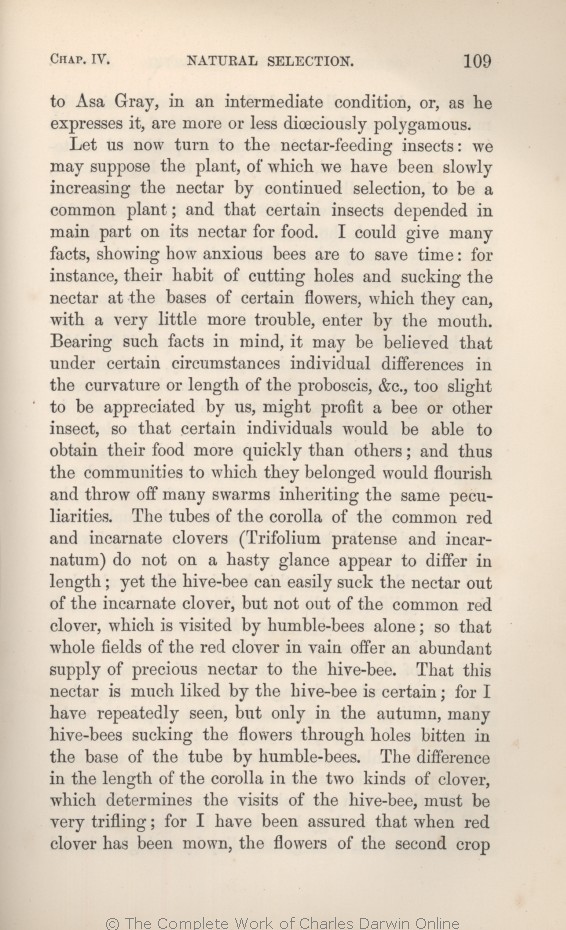Let us now turn to the nectar-feeding
insects: | insects: 1869 | | insects 1859 1860 1861 1866 | | insects; 1872 |
| OMIT 1869 1872 |
| in our imaginary case: 1859 1860 1861 1866 |
| plant, 1869 1872 | | plant 1859 1860 1861 1866 |
| facts, 1859 1860 1861 1866 1869 | | facts 1872 |
| time: 1866 1869 1872 | | time; 1859 1860 1861 |
| they can, with a very little more trouble, 1859 1860 1861 1866 1869 |
| with a very little more trouble, they can 1872 |
| it may be believed that under certain circumstances individual differences 1869 1872 |
| I can see no reason to doubt that an accidental deviation 1859 1860 1861 |
| it may be believed that an accidental deviation 1866 |
| curvature or length 1869 1872 |
| size and form 1859 1860 1861 1866 |
| OMIT 1869 1872 |
| body, or in the curvature and length of the 1859 1860 1861 1866 |
| ..... 1869 1872 | | far 1859 1860 1861 1866 |
| certain 1869 1872 | | an 1859 1860 1861 1866 |
| individuals 1869 1872 | | individual 1859 1860 1861 1866 |
| ..... 1869 1872 | | so characterised 1859 1860 1861 1866 |
| their 1869 1872 | | its 1859 1860 1861 1866 |
| quickly 1869 1872 | | quickly, 1859 1860 1861 1866 |
| than others; and thus the communities to which they belonged would flourish and throw off many swarms inheriting the same peculiarities. 1869 1872 |
| and so have a better chance of living and leaving descendants. 1859 1860 1861 1866 |
| 1 blocks not present in 1869 1872; present in 1859 1860 1861 1866 | | Its descendants would probably inherit a tendency to a similar slight deviation of structure.
|
| corolla 1866 1869 1872 | | corollas 1859 1860 1861 |
| in vain offer 1869 |
| offer in vain 1859 1860 1861 1866 1872 |
| bitten in 1869 1872 | | in 1866 |
| OMIT 1869 1872 |
| which had been bitten 1866 |
| difference 1866 1869 1872 | | differ- ence 1861 |
| in the two kinds of clover, which 1866 1869 1872 |
| which 1861 |
| hive-bee, 1866 1869 1872 | | hive-bee 1861 |
| assured 1866 1869 1872 | | informed, 1861 |
| ..... 1866 1869 1872 | | the 1861 |
|









